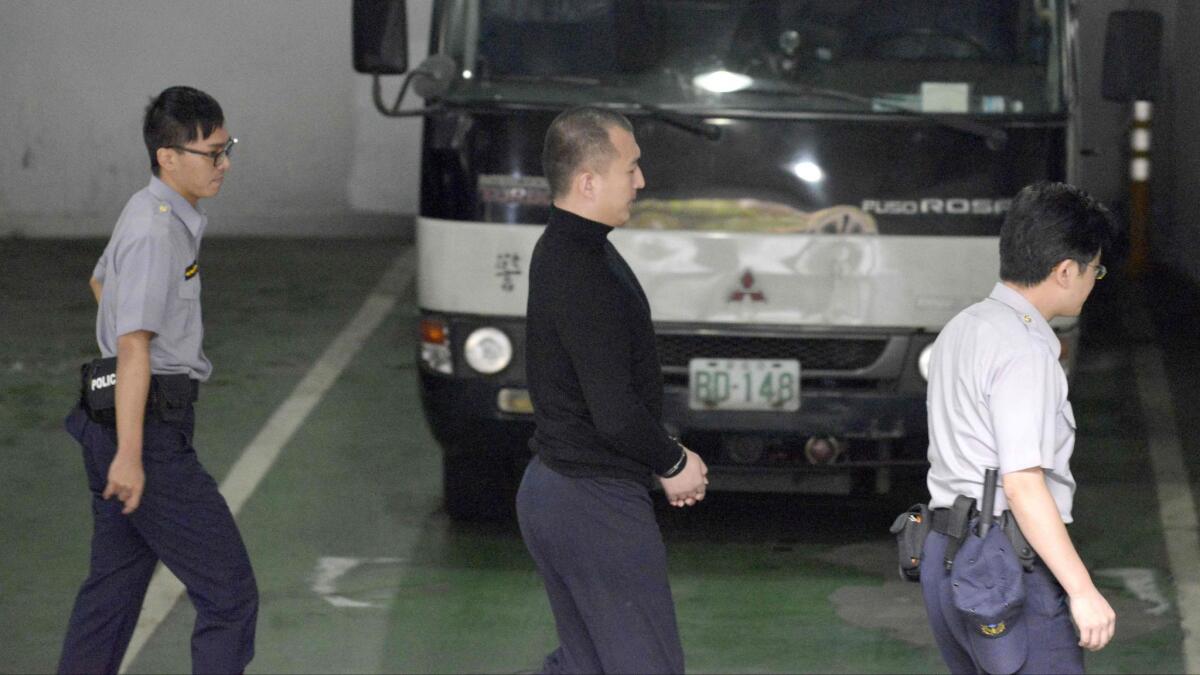Two criminal cases — one in China, one in Taiwan — show a deeper rift between the political systems

Reporting from Taipei, Taiwan — Courts in China and Taiwan, rivals for 70 years, each took a criminal state-security case this week involving a suspect from the other side, and outcomes so far are baring schisms between the political systems that will complicate already strained relations.
A court in China’s Hunan province heard the case Monday against Lee Ming-che, a Taiwanese activist charged with subversion of state power. He faces 10 years in a Chinese prison if convicted of using social media since 2012 to advocate multiparty democracy for the Communist country.
On Friday, the district court in Taipei sentenced Chinese national Zhou Hongxu to 14 months in prison for endangering state security. The 29-year-old MBA holder tried to bribe a government worker to pass information to China, a court statement says.
These cases are reminders of the festering divide between Taiwan — with its 30-year democracy — and China’s Communist rule. In Taiwan, it raises support for its autonomy from Beijing and frustrates China’s goal of uniting the two lands. China claims sovereignty over self-ruled Taiwan.
“These cases will remind people China’s not a free country ruled by law — maybe politically motivated — and people will ask the government here how to handle that,” said Gratiana Jung, senior political researcher with the Taipei think tank Yuanta-Polaris Research Institute.
Lee, a 42-year-old philosophy major who went missing on a trip to China in March, would not face prosecution in Taiwan for advocating a different type of government. China, however, regards vocal democracy advocates as threats to Communist rule.
“This is an issue about which the [Communist] Party is hyper-sensitive and maximally heavy-handed,” said Denny Roy, senior fellow at the East-West Center think tank in Honolulu. “Mr. Lee unfortunately walked into a merciless buzz saw.”
The hearing, which produced video footage shown outside court, could worry Taiwanese tourists in China as well as the 1 million to 3 million people who live there long term, usually for business, said Shane Lee, political scientist with Chang Jung Christian University in Taiwan. “I think it’s getting harder and harder to see why these things happen,” he said.
The Chinese spy case, though hardly a first for the two sides, could stir concern that Beijing is trying to undermine Taiwan further during a low point in overall relations.
China resents Taiwan President Tsai Ing-wen for rejecting Beijing’s condition for dialogue. That condition holds that both sides belong to a single country called China. China sees dialogue, which happened regularly from 2008 to 2015, as a conduit to eventual unification.
The two sides have been ruled separately since Chiang Kai-shek’s Nationalists rebased in Taiwan after losing the Chinese civil war in the 1940s.
“The biggest thing people will take away this week is awareness of the legal process,” Taiwan lawmaker Lee Chun-yi said. The Taiwanese activist’s hearing will be regarded as a “show” rather than a legal process, he said, and “they’ll trust China less.”
The bribery case, he said, raises questions about how many more people like the man sentenced Friday are still operating in Taiwan.
Most Taiwanese have said in government surveys over the past two years they oppose unification with China. Many prefer their democratic freedoms, which China cannot offer.
Washington-based advocacy group Freedom House gave China a score of 15 and Taiwan a 91 in this year’s rankings of the strongest political rights and civil liberties.
Since Tsai took office in May 2016, Beijing has sent an aircraft carrier near the island about 100 miles away, persuaded two allies to cut diplomatic ties with Taiwan and scaled back Taiwan-bound tourism.
The Taiwan government’s Mainland Affairs Council, a China policymaking body, anticipated the Lee case would affect relations with China.
“The Mainland Affairs Council appeals to mainland China after today’s court hearing to respond appropriately to the common hope from all circles and carefully act in accordance with universal values as well as trends in the just handling of human rights,” it said in a statement Monday.
The Chinese national’s sentence, about a quarter of the maximum for his crime, will show that Taiwan is not using the case to punish China, analysts say. The Tsai government has avoided directly offending Beijing even as talks have ended in a stalemate.
“It’s a very funny period of time to watch cross-Strait relations,” Shane Lee said, referring to China-Taiwan ties. “We’ve been trying to show goodwill toward China.”
Jennings is a special correspondent.
More to Read
Sign up for Essential California
The most important California stories and recommendations in your inbox every morning.
You may occasionally receive promotional content from the Los Angeles Times.










